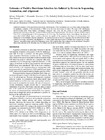Estimates of Positive Darwinian Selection Are Inflated by Errors in Sequencing, Annotation, and Alignment
dc.contributor.author
Schneider, Adrian
dc.contributor.author
Souvorov, Alexander
dc.contributor.author
Sabath, Niv
dc.contributor.author
Landan, Giddy
dc.contributor.author
Gonnet, Gaston H.
dc.contributor.author
Graur, Dan
dc.date.accessioned
2019-04-08T09:41:54Z
dc.date.available
2017-06-09T00:02:49Z
dc.date.available
2019-04-08T09:41:54Z
dc.date.issued
2009
dc.identifier.issn
1759-6653
dc.identifier.other
10.1093/gbe/evp012
en_US
dc.identifier.uri
http://hdl.handle.net/20.500.11850/20830
dc.identifier.doi
10.3929/ethz-b-000020830
dc.description.abstract
Published estimates of the proportion of positively selected genes (PSGs) in human vary over three orders of magnitude. In mammals, estimates of the proportion of PSGs cover an even wider range of values. We used 2,980 orthologous protein-coding genes from human, chimpanzee, macaque, dog, cow, rat, and mouse as well as an established phylogenetic topology to infer the fraction of PSGs in all seven terminal branches. The inferred fraction of PSGs ranged from 0.9% in human through 17.5% in macaque to 23.3% in dog. We found three factors that influence the fraction of genes that exhibit telltale signs of positive selection: the quality of the sequence, the degree of misannotation, and ambiguities in the multiple sequence alignment. The inferred fraction of PSGs in sequences that are deficient in all three criteria of coverage, annotation, and alignment is 7.2 times higher than that in genes with high trace sequencing coverage, “known” annotation status, and perfect alignment scores. We conclude that some estimates on the prevalence of positive Darwinian selection in the literature may be inflated and should be treated with caution.
en_US
dc.format
application/pdf
en_US
dc.language.iso
en
en_US
dc.publisher
Oxford University Press
en_US
dc.rights.uri
http://creativecommons.org/licenses/by-nc/2.5/
dc.subject
multiple sequence alignment
en_US
dc.subject
sequencing quality
en_US
dc.subject
gene annotation
en_US
dc.subject
positive Darwinian selection
en_US
dc.title
Estimates of Positive Darwinian Selection Are Inflated by Errors in Sequencing, Annotation, and Alignment
en_US
dc.type
Journal Article
dc.rights.license
Creative Commons Attribution-NonCommercial 2.5 Generic
dc.date.published
2009-06-05
ethz.journal.title
Genome Biology and Evolution
ethz.journal.volume
1
en_US
ethz.journal.abbreviated
Genome Biol Evol
ethz.pages.start
114
en_US
ethz.pages.end
118
en_US
ethz.version.deposit
publishedVersion
en_US
ethz.identifier.wos
ethz.publication.place
Oxford
en_US
ethz.publication.status
published
en_US
ethz.date.deposited
2017-06-09T00:03:02Z
ethz.source
ECIT
ethz.identifier.importid
imp59364cc04044b97623
ethz.ecitpid
pub:33426
ethz.eth
yes
en_US
ethz.availability
Open access
en_US
ethz.rosetta.installDate
2017-07-14T18:14:06Z
ethz.rosetta.lastUpdated
2022-03-28T22:44:35Z
ethz.rosetta.versionExported
true
ethz.COinS
ctx_ver=Z39.88-2004&rft_val_fmt=info:ofi/fmt:kev:mtx:journal&rft.atitle=Estimates%20of%20Positive%20Darwinian%20Selection%20Are%20Inflated%20by%20Errors%20in%20Sequencing,%20Annotation,%20and%20Alignment&rft.jtitle=Genome%20Biology%20and%20Evolution&rft.date=2009&rft.volume=1&rft.spage=114&rft.epage=118&rft.issn=1759-6653&rft.au=Schneider,%20Adrian&Souvorov,%20Alexander&Sabath,%20Niv&Landan,%20Giddy&Gonnet,%20Gaston%20H.&rft.genre=article&rft_id=info:doi/10.1093/gbe/evp012&
Dateien zu diesem Eintrag
Publikationstyp
-
Journal Article [128933]

